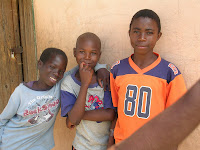 I have finally caved in. Growing up in the fantastic land of milk and honey (aka California), I never experienced food items like pork or that horrible thing called red meat. And although my husband finds this generally offensive, I am naturally drawn to turkey burgers, 'Turkey Jaynes' (a turkey-type of sloppy joes), and canned tuna sans mayo. I think tofu corn dogs are pretty tasty.
I have finally caved in. Growing up in the fantastic land of milk and honey (aka California), I never experienced food items like pork or that horrible thing called red meat. And although my husband finds this generally offensive, I am naturally drawn to turkey burgers, 'Turkey Jaynes' (a turkey-type of sloppy joes), and canned tuna sans mayo. I think tofu corn dogs are pretty tasty.I really love the fact that my background helped me to be health-conscious as we plan out our meals. While I'm perfectly happy to eat beans every night, Mark has a different opinion. Mark says he has never eaten so little meat until he married me. And I have never eaten so much meat until I became a DeLew. So, we're both doing some growing. Well today I decided to take the plunge and connect to this land known as the Midwest. It's called pork roast. Not just pork roast, but cooking pork roast in a crock pot. And this pork roast included potatos and carrots- my two least favorite cooked vegetables... but I like to please my husband. And let's be honest, things are generally better at the Whipple when he's happy and full :) So, I made the plunge.
This morning before work I threw the onions, potatoes, carrots, garlic, diced tomatoes, and wine (because it's a New DeLew pork roast!), and spices all into this crazy crock pot. As Mark and I left the apartment all bundled up to brave the cold weather, I felt like such a Midwestern Wife. And then encountering the meaty smell wafting through the Whipple after work, I felt even more midwestern. So today was a stretching experience for this New DeLew- using pork roast, crock pots, and potatoes in one meal! The truth is, although I cling to my California roots like it's my job, I must admit that I still enjoyed this midwestern dinner!
So the recipe is as follows (thanks to my wonderful sister Sarah, who was also appeasing her midwestern husband):
Throw a pork roast, 2 chopped potatoes, some sliced carrots, 1-2 onions, 4 garlic cloves, a 15 oz can of diced tomatos, 1 cup of red wine, and tons o' spices into a crock pot. Cook on low heat for 8 hours. Enjoy!





